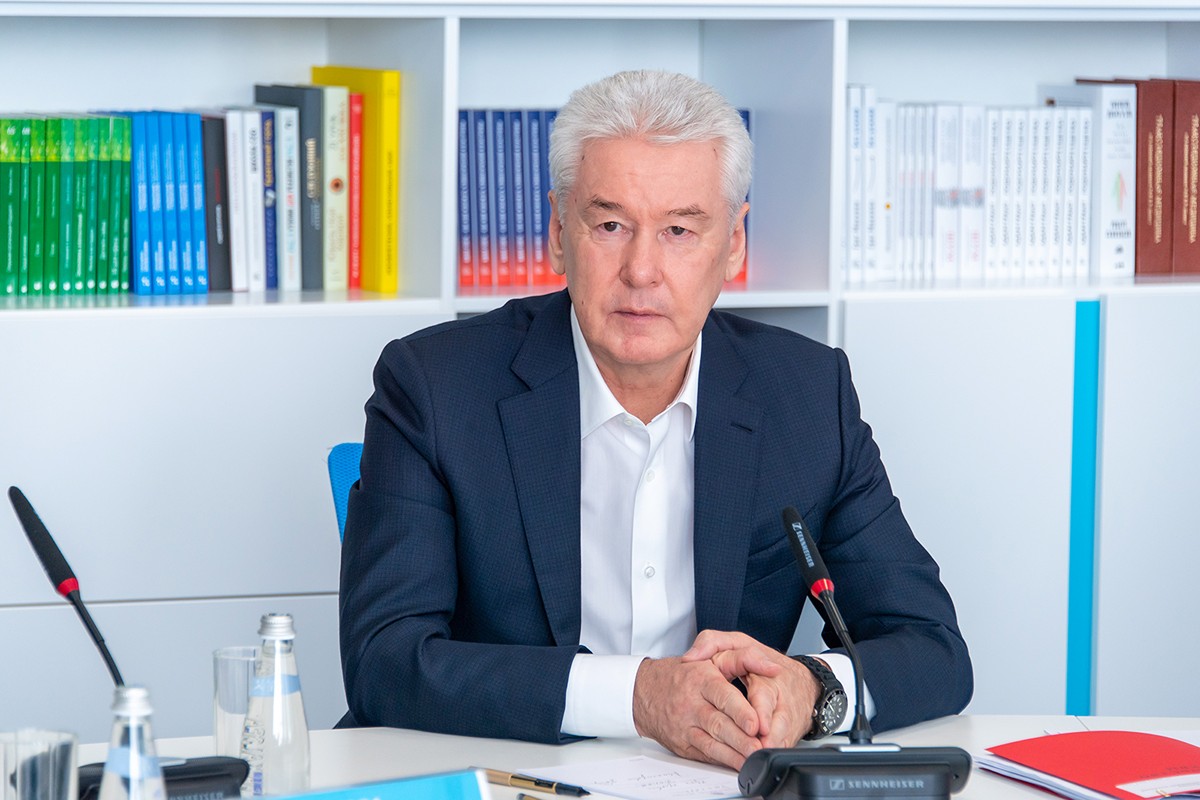
S. Sobyanin on import substitution support measures


Sergey Sobyanin held a meeting with representatives of major pharmaceutical companies where they discussed the development of the industry and import substitution in conditions of external sanctions pressure.
"Under the conditions of sanctions pressure, problems related to logistics, price changes, changes in the national currency exchange rate, all this is of paramount importance. I mean support measures, interaction between the state and business, and understanding of the problems we face today. Moscow pharmaceutical industry is one of the largest in the country. In recent years, we have seen high growth rates: in five years, sales more than quintupled. The number of employees has increased by one and a half times. And we see that this dynamics continues," the Mayor of Moscow said.
This is partly due to the beginning of the COVID-19 pandemic, when the city was ramping up production. According to Sergey Sobyanin, the capital's pharmaceutical industry coped with this period despite logistical, price and other difficulties. Today Moscow has a whole system of industry support, including the assignment of industrial complex status to enterprises, the creation of special economic zones. In addition to this, the purchase of equipment and technology is subsidized, concessional loans are granted and other support measures are provided.
Sergey Sobyanin underlined that a program of offset transactions was implemented in Moscow according to which businesses would be guaranteed the purchase of goods produced by them for the state budget institutions.
"We guarantee not for a year, not for two years, but for 10 years. We form an order for this, and for this order we negotiate with suppliers, so that they not only supply us with these medicinal products, but also deploy import-substituting production in Moscow. Today we have four such contracts worth over 40 billion rubles. They need to be brought up to speed, as they say, and to form new offset contracts, including the supply of not only medicinal products but also consumables for medicine and other areas," the Mayor of Moscow said.
The city is updating all measures to support industry. In particular, it has been decided to increase the capitalization of the industrial support funds up to 10 billion rubles. There is active work with the Government of the Russian Federation, joint measures of support are being developed.
Another measure of support, which will appear in the near future, is the subsidizing of preferential loan rates for backbone enterprises. Other decisions are also being discussed, in particular those related to the work of the Moscow health care system.
"They also have many opportunities to support the industry. I mean the creation of joint programs related to clinical trials of medicinal products, which were conducted quite a lot in the last period. We will expand these programs so that you could quickly enter the market with new products, ensuring import substitution," Sergey Sobyanin said. "In addition, we have a whole program of immunoglobulin production, also together with the Moscow health system, without which it is impossible to implement. A whole nomenclature of medicines, which today are almost 100 percent produced abroad."
Sergey Sobyanin raised the subject of consumables procurement. The city organizes system procurement and possibly develops long-term contracts on the basis of offset deals. "As for blood products, we have deployed a number of quite powerful donor centers for the collection of blood and plasma for the subsequent manufacture of medicinal products. We will increase these volumes in order to create appropriate groups of medicinal products in Moscow."
Moscow has a sufficient stock of discounted, life-saving medicines and medicinal products required for outpatient and inpatient care. In addition, these purchases will be increased up to 70 percent in advance, if necessary.
The Mayor of Moscow added that the problem of shortage or imaginary shortage, rush demand would be solved only one way - by ensuring the availability of goods on the counter. "But the most important thing is to have a stock of medicinal products, to supply medicinal products to the retail network in time, so that citizens have no fears and concerns. You are absolutely correct to say that there is a fairly stable supply of imported medicinal products and there are no major concerns about supply disruptions. Of course there are logistic costs, but I think companies will cope with them. So I hope that the pharmaceutical market will also stabilize in the coming weeks," the Mayor of Moscow concluded.
New support measures
Moscow pharmaceutical industry will be able to take advantage of city support measures, which include:
- Provision of land plots for the construction of new production facilities at the rate of one ruble per year;
- Subsidies from the city Industrial Development Fund to subsidize interest rates to replenish working capital. The decision on additional capitalization of the fund for 10 billion rubles was made;
- Support of the project of creation of domestic immunoglobulin production on the basis of medical organizations of Moscow and the existing infrastructure for blood procurement together with Nacimbio;
- Increase in advance payments for the purchase of medicines for state needs to 70 percent;/li>
- Application of the prepayment mechanism for purchased products for suppliers with extensive supply experience and a reputation as reliable partners in the execution of government contracts;
- Support, including funding from the city budget, for clinical trials of medicinal products and approbation of consumables and medical products from local manufacturers on the basis of Moscow hospitals (this measure will make it much cheaper and faster to introduce new medicinal products and products into practical health care).
In addition, together with the federal authorities, the Moscow government plans to prepare a number of additional measures, among them:
- Reducing the minimum threshold of investment in offset contracts from one billion to 100 million rubles, as well as improving the offset mechanism (this measure will allow the implementation of import substitution projects for a wide range of medicinal products, medical products and consumables);
- Simplification of procedures for registration and circulation of new domestic medicines and medical products.
- Pharmaceutical industry in Moscow
Moscow is the largest producer of medicines and medical products in Russia. There are 84 enterprises in the city, which employ about 11 thousand people.
The pharmaceutical industry is on the rise. According to 2021 results, the production of medicinal products in Moscow increased by 67.7 percent. And the volume of shipped products increased by 75.4 percent reaching 345 billion rubles. Investment has quadrupled amounting to 14.4 billion rubles.
The growth of investment and production has resulted owing to systematic support for the industry, which it has received from the Moscow City Government and the federal authorities in recent years.
In particular, by decision of the Moscow City Government, payments for changing the purpose of granting land plots intended for the construction of production facilities were cancelled or substantially reduced. This decision stimulated the reconstruction and new construction of production facilities.
The land use and development rules approved by the Moscow Government took into account in advance the prospects for the development of pharmaceutical enterprises.
Six industry enterprises (Federal State Unitary Enterprise “Moscow Endocrine Plant”, JSC Moscow Pharmaceutical Factory and others) were given the status of an industrial complex, which gave them the right to receive benefits on tax and land payments. The total amount of savings on regional taxes is up to 25 percent. The total amount of benefits in 2021 is 52.2 million rubles.
The tax benefits include a decrease in profit tax from 20 to 16.5 percent, property tax - by half, land tax and land rent - by 80 percent. The savings are used by the industrial complexes to modernize existing facilities and to launch new ones.
Eight enterprises of the industry are residents of SEZ "Technopolis Moscow" and enjoy relevant federal and regional tax benefits. Two pharmaceutical companies became recipients of city subsidies for the development of production in the total amount of 38 million rubles.
And finally, the largest measure of support for the pharmaceutical industry and the development of import substitution were offset contracts, agreements to localize production in Moscow in exchange for guaranteed supplies of products for state needs.
At the moment the Moscow Government has signed four offset contracts for the supply of medicines and medical products. The total amount of product supplies under these contracts over 10 years will amount to 41.7 billion rubles, the amount of investment will amount to 10.8 billion rubles.
Two new pharmaceutical production facilities have already been put into operation, and supplies of medicinal products and medical products are being delivered to city hospitals. Biocad CJSC supplies 30 medicinal products for treatment of 11 types of diseases (including multiple sclerosis, oncology and oncohematology, neurology, rheumatology, orphan diseases). Gemamed LLC supplies medical products for stoma patients (12 items in total). Medical products manufactured under an offset contract in Moscow have been supplied to patients in the capital since January 2022.
Source: mos.ru